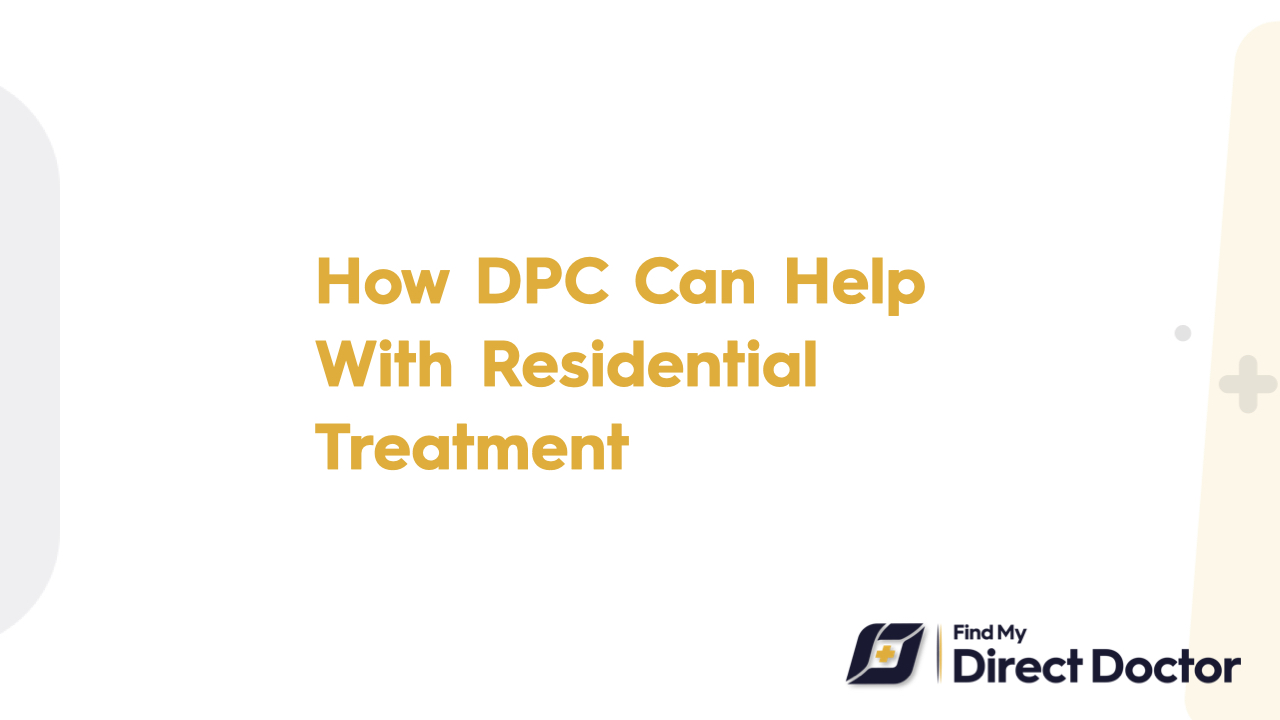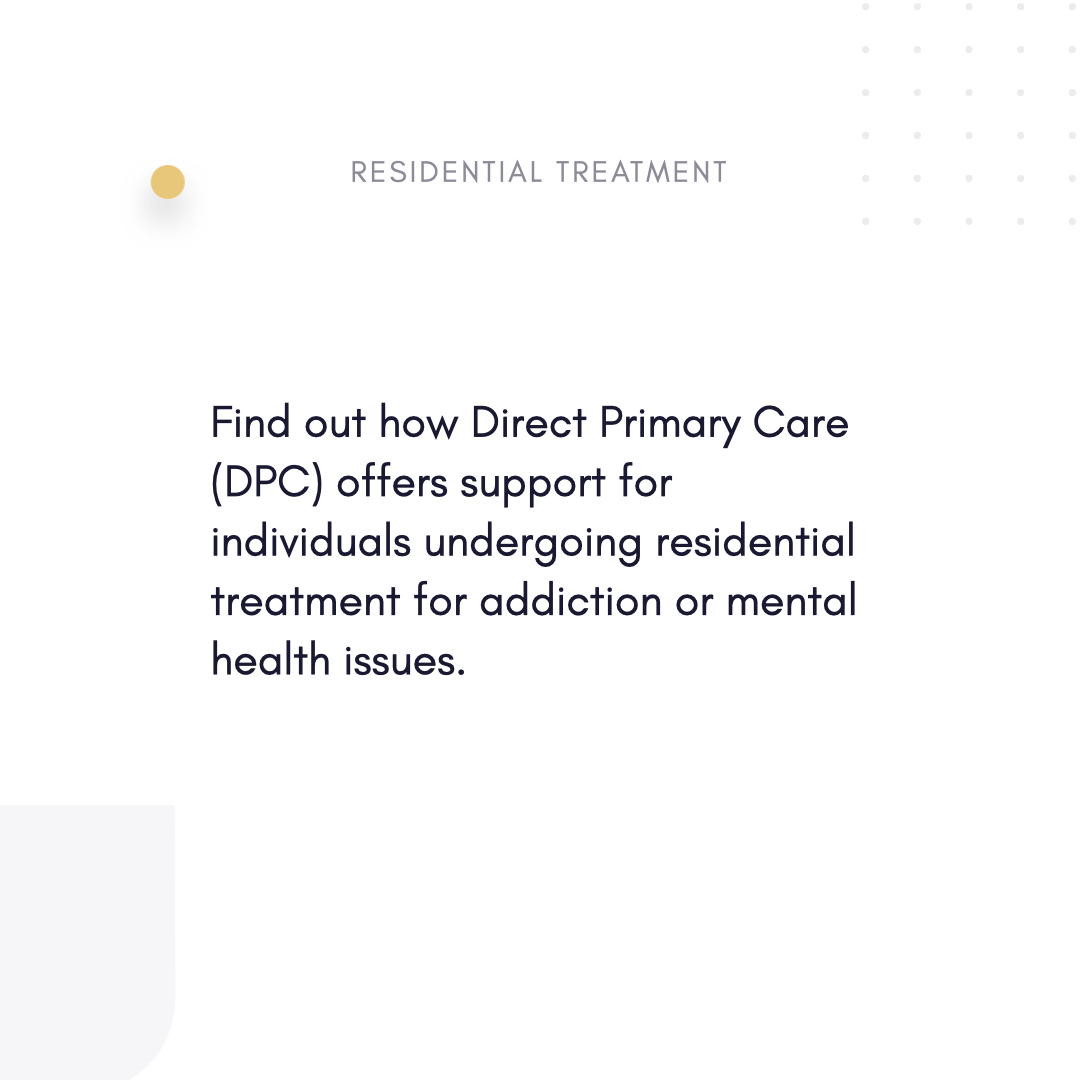Residential Treatment and Direct Primary Care (DPC): Holistic Healing, Personalized Support
If you need a lot of help with your mental health or addiction, residential treatment can be a safe place to get it. DPC makes sure that your journey is well-planned, affordable, and personalized to your recovery.

Learning about residential treatment: full recovery
Residential treatment offers therapeutic care around the clock for conditions such as:
- Addiction: Alcoholism and substance use disorders.
- Mental health: serious depression, PTSD, and eating disorders.
- Dual diagnosis: having both a mental health problem and an addiction at the same time.
Important information:
- Duration: Usually 30 to 90 days, but some programs last up to 6 months.
- Costs: DPC partnerships (200–500 USD/month) are cheaper than traditional programs (10,000–30,000 USD/month).
Risks of not treating conditions:
- Relapse, overdose, and suicide.
How DPC Improves the Results of Residential Treatment
Direct Primary Care (DPC) changes the way people recover by making sure that everything works together and putting the patient first.
Full Coordination of Admissions
- Quick referrals: Make sure there is a bed available within 48 to 72 hours for crisis cases.
- Planning a medical detox: Work with facilities to make sure withdrawal is safe.
- Insurance navigation: Help people who pay for their own care find grants or sliding-scale options.
Clear Prices and Care That Works Together
- Support that covers everything: Membership includes pre-treatment consultations, family therapy, and plans for after discharge.
- Saving money: DPC-negotiated facility rates can save you 20–40%.
- Holistic focus: Take care of both your mental and physical health (for example, your liver function and nutrition).
Recovery and Relapse Prevention Tailored to You
- Access 24/7: Use telehealth to deal with cravings or side effects of medications.
- Planning for aftercare: Set up IOP (intensive outpatient), sober living, or 12-step groups.
- Monitoring for a long time: Check in every three months to keep track of sobriety milestones and mental health.
Advantages of DPC for Inpatient Treatment Patients
- No waiting times: 80% of DPC patients start treatment within a week, while it used to take three weeks or more.
- Continuity: One team is in charge of medications, therapy, and other health problems that go along with them, like diabetes or HIV.
- No extra costs: Clear pricing (for example, 8,000 USD per month for DPC-partnered rehab).
Success Stories from Real Life
- Case 1: Lena, 32, who is addicted to opioids. Lena's DPC provider got her a 90-day stay in rehab. Now that she has been sober for two years, she helps other people.
- Case 2: Marcus, 45 years old, has depression that won't go away with treatment. Marcus's DPC team set up ECT while he was in residential care, and he was free of symptoms in 8 weeks.
FAQs: Living in DPC for Treatment
- Q: Can DPC help with rehab that the court ordered?
- A: Yes. You should plan evaluations and compliance reports to meet legal requirements.
- Q: Do family visits count?
- A: DPC makes it possible for families to have therapy sessions in person or online.
- Q: What if I go back to using drugs after treatment?
- A: DPC sets up step-up care (PHP/IOP) without making any judgments.
- Q: Do you cover holistic therapies?
- A: Yes. DPC partners can help you get yoga, acupuncture, or art therapy.
Why DPC is the Best Place for Recovery Care
The Substance Abuse and Mental Health Services Administration (SAMHSA) stresses the importance of integrated care. DPC gets things done by:
- Cutting down on readmissions: Support after discharge lowers the chances of relapse by 35%.
- Increasing participation: 90% of DPC patients finish treatment, compared to 60% of patients in the U.S.
- Members save 15,000 USD to 50,000 USD a year by getting better rates.
Final Thoughts
In DPC, residential treatment isn't just about staying in a facility; it's about working with a team that is committed to your health for the rest of your life. With DPC, you can avoid long waits in the bureaucracy, get the best care, and get a recovery plan that works for you. From detox to discharge, you can heal as much as your courage allows.






